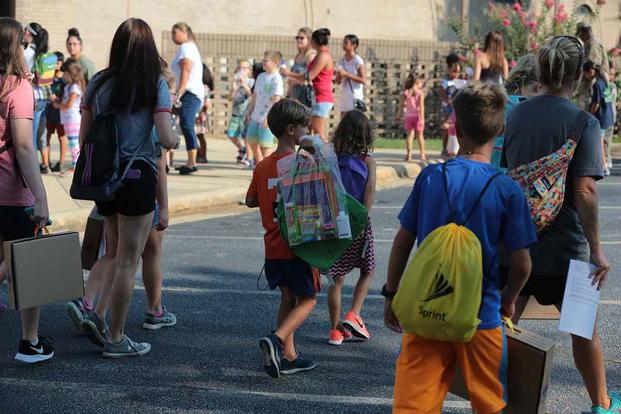
Military Kids May Be the Key to Fixing Special Education
| EFMP Stories, Resources

11 Feb 2021Military.com | By Jennifer Barnhill
Jennifer Barnhill is a freelance writer with a focus on military family advocacy, a Navy spouse of 14 years and the mother of three. She is the chief operating officer for Partners in PROMISE, a Secure Families Initiative volunteer and serves on the National Military Spouse Network 2020 Steering Committee.

Marisa Norman has testified in court twice. She has been sued by her own school district. She has moved four times and attended eight schools. Despite being only 17 years old, and with 21 diagnosed disabilities, she faced all this because her dad serves our nation. She is a military kid in special education.
Marisa is not the only kid struggling with special education in the COVID-19 environment. Special education is in jeopardy today because distance learning has denied families legally guaranteed services, support and accommodations often delivered in a brick-and-mortar schoolhouse. But hope is in sight for military students in the form of improvements to military special education programming included in the 2021 defense spending bill.
Could this be the precursor needed to fix the systemic problems with special education in America?
A History of Experimentation
There is a long-standing correlation between military policy updates and changes to the civilian status quo. The desegregation of the armed services in 1948 preceded the Brown vs. the Board of Education ruling by six years. While controversial today, 1993’s “Don’t Ask, Don’t Tell” policy groundbreakingly allowed gay service members to remain in and join the military. Although they were not openly welcomed, the policy of not singling out individuals by sexual preference helped to shift the public’s focus away from AIDS and toward a civil rights-based agenda, which gained momentum in the 2000s. Marriage equality was signed into law in 2015.Advertisement
This begs the question of whether these types of social policies are initiated by an internally motivated desire to fix a broken system or in reaction to external societal pressures. It is most likely a mixture of the two. Civilian parents of children in special education may want to keep an eye on what is happening in military special education to see how responsive the government will be to their plight.
The Military Special Education Problem
Military families move to new cities and school districts every two to three years. Military children struggle to make new friends and keep up with education gaps. These gaps are widened for military students in special education.
There are approximately 130,000 families enrolled in the military’s Exceptional Family Member Program, or EFMP. The primary purpose of this program has historically been tied to assignment coordination and the availability of necessary medical services. Military families do not have much say in where they live or send their children to school.
“We are made to feel like our parental intuition was based on emotions, not fact,” said Michelle Norman, Marisa’s mother, a Navy spouse and a special education parent. “When we pushed back, meetings became hostile, not collaborative and, worse, the school district was not allowing her access to the education as outlined in her [Individualized Education Program].”
When military families transfer into new school districts, they are often asked to wait to implement or redraft their existing IEPs. Families like the Normans cite instances of feeling that their military status is an indicator for school districts that they are temporary and can be “waited out.”
When disagreements arise between parents and schools and informal complaints cannot be resolved, the final step is filing for a court hearing, called due process. Unlike other military special education families, Marisa’s family was in a financial position to push back due to Capt. Cassidy Norman’s role as a senior officer. The Normans filed and won their first state due process hearing in 2016. The school district appealed. The Normans won again in 2018, this time at the federal level. However, according to Michelle Norman, the school district refused to comply with orders from the State’s Department of Education, a hearing officer and a federal district judge.
Instead of doing so, its next step was to sue the Normans’ 15-year-old daughter months before her father was to leave on a 15-month overseas deployment. Marisa Norman has testified twice, something that has resulted in its own mental stressors.
An End in Sight?

Special education is underfunded. At a Military Family and Veteran Town Hall in July 2020, Sen. Mark Warner, D-Va., said, “You know I support fully funding [the Individuals with Disabilities Education Act].”
He continued by discussing the historic difficulty in getting full funding for IDEA. In the era of COVID-19, with IDEA only funded 30 to 40 cents to the dollar, families are reporting increased disruptions to their children receiving a free and appropriate public education.
Warner suggested that funding for military fixes to special education may not come from IDEA or Department of Education allocations, but rather through the Defense Department via the National Defense Authorization Act, or NDAA, defense budget. “We can at least make sure these active-duty families get their full funding,” he said.
The Biden administration has also vowed to help special education, stating that “Biden will fully fund and enforce IDEA and triple Title I funding to increase resources available to educators to meet the needs of students with disabilities.”
The Navy has led change within the DoD, sponsoring special education training for its JAG Corps and EFMP staff; it even extended this training to the other service branches. Military nonprofit and grassroots organizations have advocated for changes to special education and military Exceptional Military Family Programming, resulting in legislation included in the 2021 NDAA. While these steps fall short of fixing all the problems faced by military special education families, they are bringing special education issues before Congress, and Congress has responded.
What’s Next?
Nationally, special education is still underfunded. Military special education student outcomes are unknown, because this data is not tracked . And families face frequent moves that significantly impact their children’s ability to receive a free and appropriate public education.
Progress has been made, but the finish line is still miles ahead. Now is not the time to move on to another military family readiness issue to fix, but to dig deeper. In doing so, it is possible that we may find a formula that holds the key to fix special education nationwide.





Leave a Reply